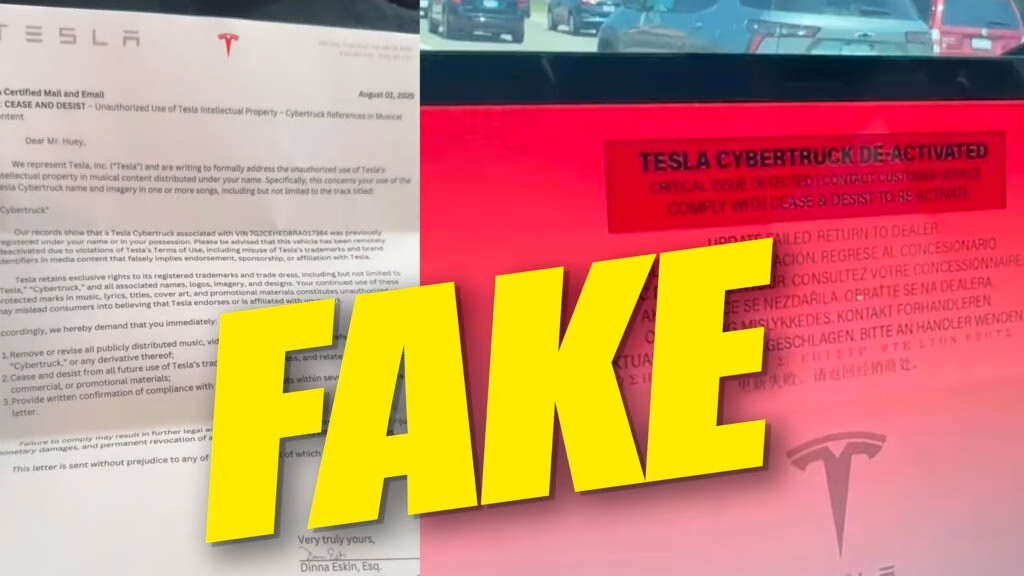Did Tesla Really Remotely Disable a Cybertruck Over a Rap Song?
If you’ve spent any time on social media lately, you might’ve seen a viral video claiming Tesla remotely shut down a Cybertruck after a rapper dropped a song about the truck. The story’s wild, right? But what’s actually going on here—and should Tesla owners be worried about their vehicles getting bricked from afar? Let’s break down the facts, the fiction, and what this saga really says about online rumors.
What Sparked the Outrage: The Viral Video Explained
Over the weekend, American rapper Big Huey posted a dramatic video to Instagram. In it, he’s stranded on the side of the highway, claiming his Tesla Cybertruck was remotely deactivated by the company. The camera zooms in on the truck’s infotainment screen, which flashes a bold red-and-white warning: Tesla Cybertruck De-Activated. There’s even a message telling him to comply with a cease and desist order to get his truck running again.
The video racked up over 112,000 likes in no time. Comments poured in—some joking about missed payments, others genuinely concerned about Tesla’s power over its vehicles. The story snowballed, with many wondering if Tesla really has a kill switch for its cars.
Did Tesla Actually Shut Down the Truck? Here’s the Truth
Let’s cut through the noise: Tesla does NOT remotely disable vehicles over music, social media posts, or even missed payments. The company quickly responded on X (formerly Twitter) and Instagram, calling the video a fake. They clarified that they don’t have a system in place to brick a car from headquarters just because someone made a song about it.
Digging deeper, the so-called cease and desist letter Big Huey flashed in a follow-up video was also a fabrication. The letter used an outdated job title for Tesla’s legal VP and included a suspicious-looking signature. In short, both the video and the letter were staged—likely as a PR stunt to promote the rapper’s new track.
How Was the Video Faked? The Tech Behind the Hoax
Here’s where things get interesting. Some eagle-eyed Reddit users figured out how the warning screen was created. Turns out, with a bit of tech know-how, you can plug a laptop into the Cybertruck’s infotainment system and display any message you want. One Redditor even replicated the exact red-and-white warning from the viral video, proving it’s not a system alert but a custom message.
This isn’t the first time someone’s used a bit of digital trickery to stir up controversy. In the age of viral content, it’s surprisingly easy to make a video look legit, even when it’s pure fiction.
Can Tesla Remotely Control or Disable Your Car?
This is the million-dollar question for Tesla owners and anyone considering an EV. While Tesla does have the ability to push software updates, track vehicles (with consent), and even lock or unlock cars in some scenarios (like repossession or theft recovery), there’s no evidence they can or do remotely disable vehicles for reasons like negative publicity or music releases.
According to industry experts and Tesla’s own statements, remote deactivation is reserved for very specific, legal situations—think law enforcement requests or extreme safety issues, and even then, it’s rare. Most automakers with connected vehicles have similar capabilities, but consumer protections and privacy laws in the US make arbitrary remote shutdowns a legal minefield.
Why Do These Stories Catch Fire So Fast?
Let’s be honest—stories like this go viral because they tap into real anxieties. We’re living in a world where our cars, phones, and even fridges are connected to the cloud. The idea that a company could flip a switch and leave you stranded is unsettling.
But it’s also a reminder to check the facts before hitting that share button. In this case, a little digital sleuthing and a statement from Tesla were enough to debunk the claim. Still, the incident highlights how quickly misinformation can spread, especially when it’s packaged in a slick, attention-grabbing video.
What Should Tesla Owners (and Everyone Else) Take Away?
If you drive a Tesla—or any modern, connected car—there’s no need to panic about your vehicle being bricked over a song or a social post. Stay informed, keep your software up to date, and don’t fall for every viral claim that pops up in your feed.
The big takeaway? Navigating tech rumors isn’t about perfection—it’s about smarter skepticism. Next time you see a story that seems too wild to be true, take a breath, dig a little deeper, and you’ll likely spot the truth before the month is out.

